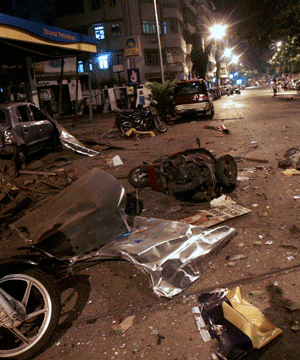China Blocks UN Proposal To Blacklist Sajid Mir
Context
China on Tuesday prevented India and the United States from designating Lashkar-e-Taiba terrorist Sajid Mir as a global terrorist at the UN. Mir is headquartered in Pakistan. Mir is sought after for his involvement in the 26/11 terrorist strikes in Mumbai.
UNSC 1267 Committee
- Establishment: The UN Security Council Resolution 1267 was adopted in 1999, which led to the creation of the UNSC 1267 Committee. Concerns over the Taliban and Al-Qaeda’s operations led to the resolution, which was intended to confront the threat posed by these groups.
- Mandate: The major responsibility of the committee is to monitor the application of the restrictions set by Resolution 1267. Sanctions against people and organisations connected to the Taliban and Al-Qaeda are among these measures. Asset freezes, travel restrictions and arms embargoes are all part of the sanctions.
- Sanction List: The “1267 List” or “Taliban/Al-Qaeda Sanctions List,” which lists people and organisations subject to sanctions, is kept up to date by the committee. The details on the targeted people or organisations and the particular sanctions imposed on them are included on the list, which is frequently updated.
- Composition: All 15 United Nations Security Council members are represented on the committee. Every member state designates a delegate to the committee, who is frequently a diplomat or counterterrorism specialist.
- Decision-making: The committee makes decisions together with the support of all member states because it functions by consensus. This guarantees that the full Security Council will endorse the committee’s decisions.
- Review Procedure: The committee examines requests for the addition of people or organisations to the sanctions list or for their removal. To decide whether a person or entity should be delisted or subject to sanctions, it carefully assesses the available information and evidence.
- Exemptions: The committee also takes into account petitions for waivers of penalties or other pertinent issues. Exemptions may occasionally be granted for humanitarian causes or where communicating with a person or organisation on the prohibited list is necessary.
- Evolving Mandate: The committee’s role has changed over time to include addressing new terrorist threats. It now includes additional people, entities, and groups connected to terrorism in addition to the Taliban and Al-Qaeda.
- Cooperation: To put the sanctions system into effect, the committee closely collaborates with member nations, international organisations, and other bodies. It promotes international coordination, information sharing, and cooperation to increase the efficacy of counterterrorism measures.
- Impact on the World: The sanctions imposed by the UNSC 1267 Committee can impede people’s ability to engage in terrorism by limiting their access to resources, restricting their ability to move around, and freezing their assets.
- Support for Counterterrorism: The committee is essential in providing support for international counterterrorism initiatives by enacting targeted sanctions and fostering international cooperation. To make it more difficult for terrorist organisations to plan and carry out attacks, it seeks to interfere with their financial networks and operational capabilities.
What happened in the committee?
- Sajid Mir, a terrorist with ties to Pakistan, is wanted for his participation in the 2008 Mumbai terrorist strikes, which resulted in the deaths of over 160 people, including citizens from other countries.
- At the UN, Sajid Mir’s designation as a global terrorist under the 1267 Al Qaeda Sanctions Committee of the UN Security Council was jointly requested by India and the US.
- Sajid Mir would have been subject to sanctions like asset freezes, travel restrictions, and arms embargoes as a result of the designation.
- The proposal to name Sajid Mir as a worldwide terrorist was stopped by China, a close ally of Pakistan. This is consistent with China’s earlier vetoes of such lists for terrorists located in Pakistan.
- China’s persistent obstruction of blacklistings of terrorists with ties to Pakistan has wider ramifications for global efforts to fight terrorism and hold people accountable for their involvement in terror activities.
- A major area of disagreement during the Financial Action Task Force (FATF) evaluation of Pakistan’s progress on the action plan in late 2022 was the matter of China’s actions in opposing the request to identify Sajid Mir as a global terrorist.
Financial Action Task Force (FATF)
- Mandate: The FATF oversees international efforts to combat money laundering, financing terrorism, and financing of the development of new weapons. Its main objective is to establish and advance global norms and regulations to stop these illegal operations.
- Standards Development: The FATF carries out research and analysis to comprehend the procedures and strategies used for money laundering and financing terrorism. Using this information, it creates guidelines and recommendations, often known as the FATF Standards or the 40 Recommendations, to assist nations in strengthening their frameworks for combating money laundering and financing of terrorism.
- Global Implementation: More than 200 nations and regions have made commitments to put the FATF Standards into practice. This dedication is a component of an organised international effort to combat terrorism, organised crime, and corruption. The FATF offers a thorough framework for nations to set up successful mechanisms to combat financial crimes.
- Collaboration: The FATF collaborates with various international organizations, including nine FATF Associate Member organizations, the International Monetary Fund (IMF), and the World Bank. These partnerships aim to enhance the effectiveness of global efforts in combating money laundering and terrorist financing.
- Plenary Meetings: The FATF Plenary, its decision-making body, meets three times a year. During these meetings, member countries and jurisdictions discuss emerging issues, exchange information and best practices, and make decisions on matters related to money laundering, terrorist financing, and the implementation of the FATF Standards.
- Accountability: If a country consistently fails to meet the FATF Standards, the FATF holds it accountable. The country may be designated as a Jurisdiction under Increased Monitoring or a High-Risk Jurisdiction. These designations are informally known as being on “grey” and “black” lists, respectively. Being on these lists can have significant implications for a country’s reputation and its access to the international financial system.
- Headquarters: The FATF is based in Paris, France. It operates as an intergovernmental organization and serves as a hub for global cooperation in combating money laundering, terrorist financing, and the financing of weapons proliferation.




